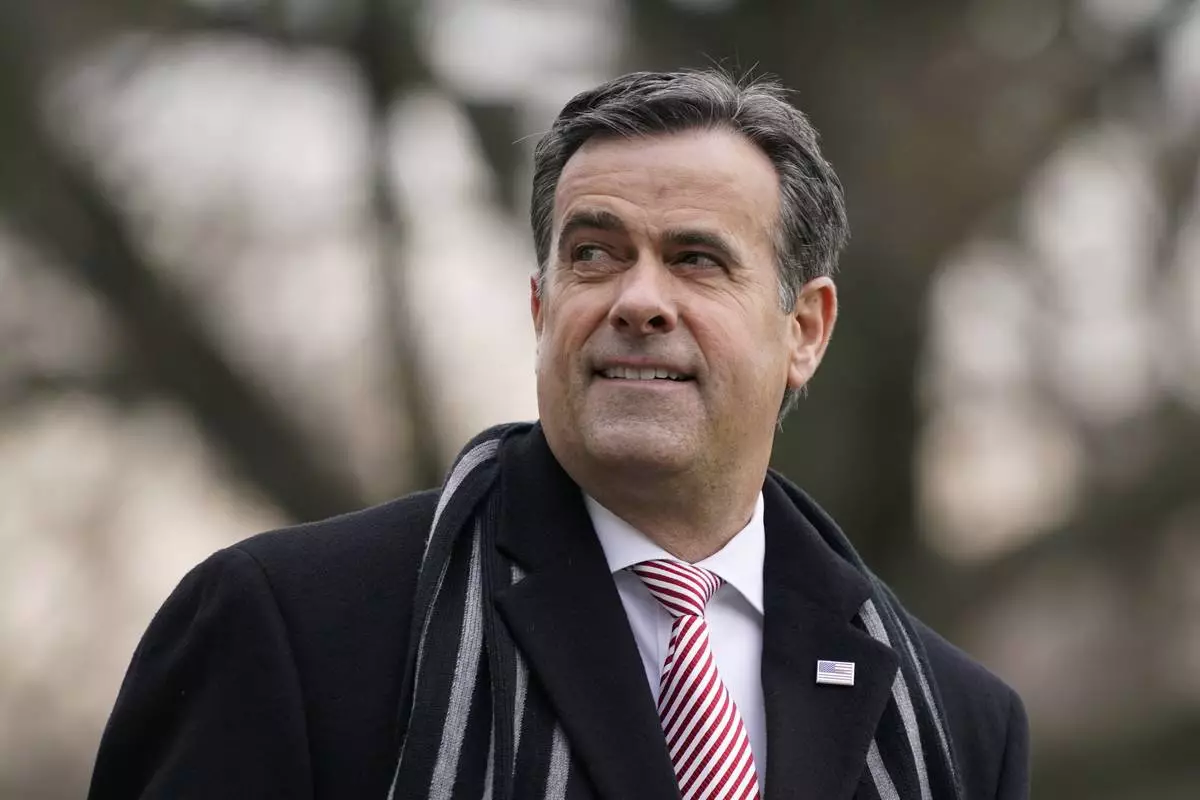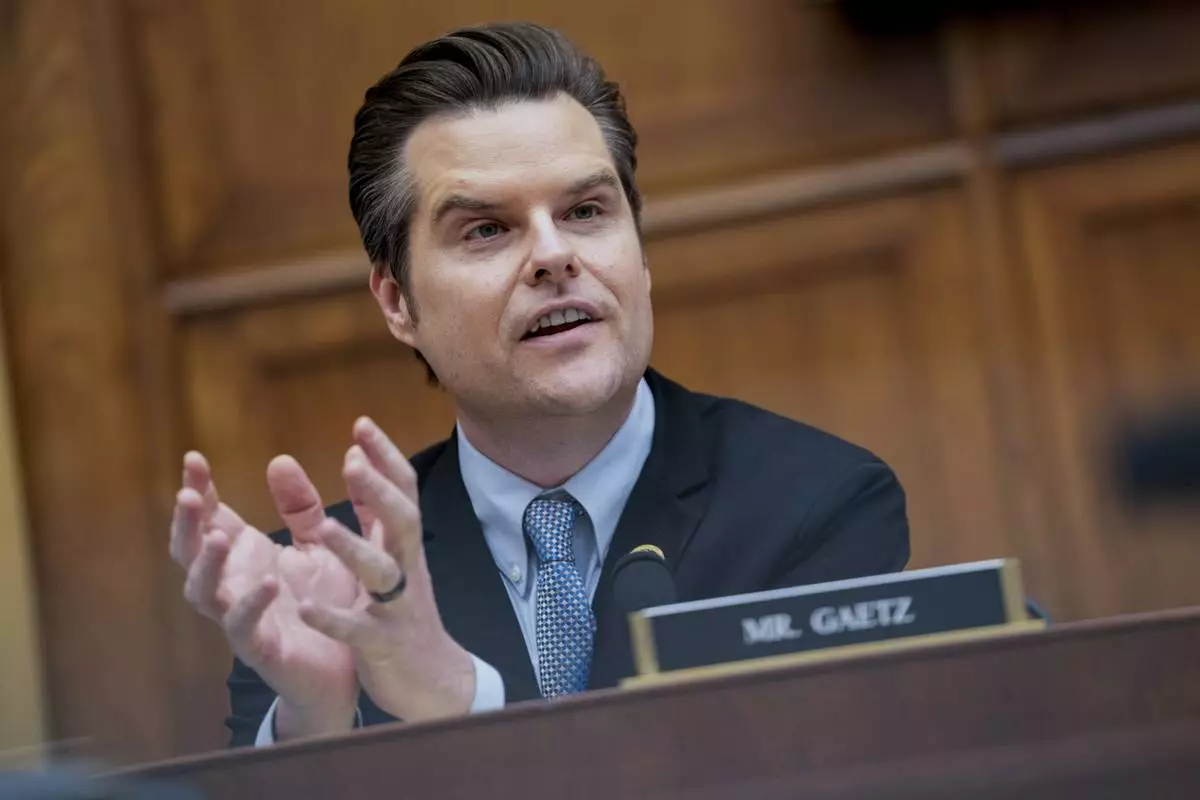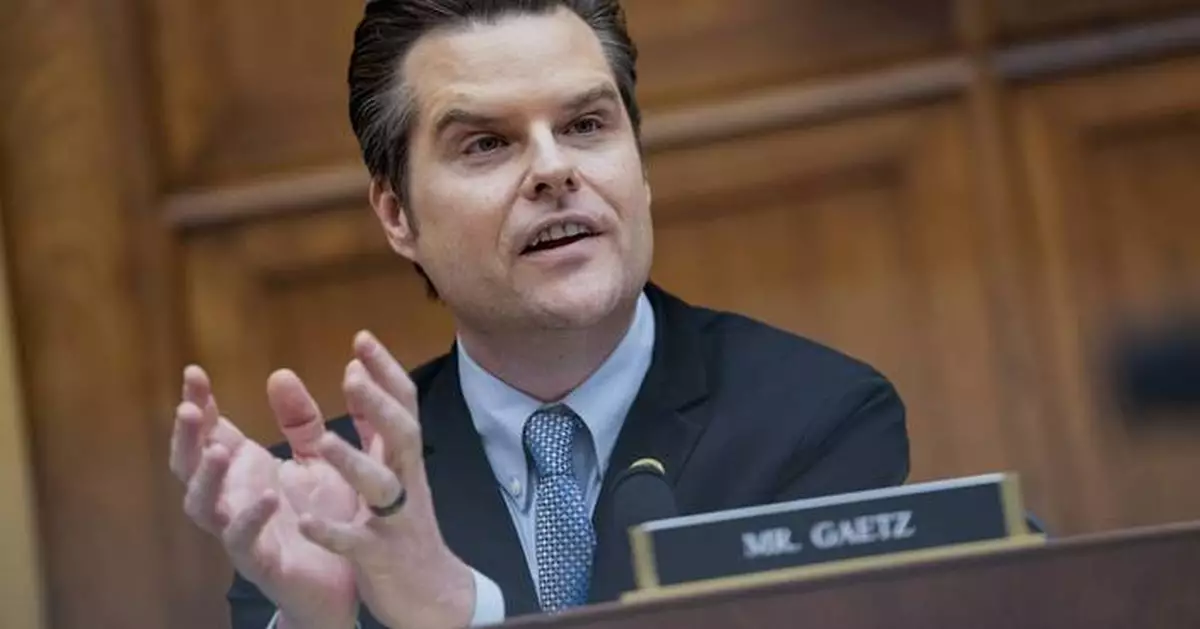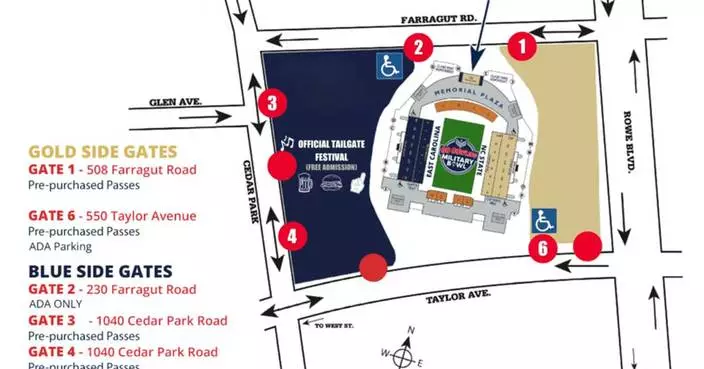WASHINGTON (AP) — Donald Trump has had few defenders in Congress as reliable as Matt Gaetz, who has thundered at one prosecutor after another for perceived bias against the president-elect and emphatically amplified the Republican's rallying cry that the criminal investigations into him are “witch hunts.”
That kinship was rewarded Wednesday when Trump named Gaetz as his pick for attorney general, turning to a conservative loyalist in place of more established lawyers who'd been seen as contenders.
In announcing his selection of Gaetz as attorney general and John Ratcliffe a day earlier as CIA director, Trump underscored the premium he places on loyalty, citing both men's support for him during the Russia investigation as central to their qualifications and signaling his expectation that leaders in his administration should function not only as a president's protector but also as an instrument of retribution.
The dynamic matters at a time when Trump, who will enter office in the wake of two federal indictments expected to soon evaporate and a Supreme Court opinion blessing a president's exclusive authority over the Justice Department, has threatened to pursue retaliation against perceived adversaries.
“Matt will root out the systemic corruption at DOJ, and return the department to its true mission of fighting Crime, and upholding our Democracy and Constitution. We must have Honesty, Integrity, and Transparency at DOJ,” Trump wrote in a social media post about Gaetz, a Florida Republican.
The rhetoric from Trump reflects an about-face in approach from President Joe Biden, who has repeatedly taken a hands-off approach from the Justice Department even while facing a special counsel investigation into his handling of classified information and as his son, Hunter, was indicted on tax and gun charges.
Democrats immediately sounded the alarm, with Sen. Dick Durbin, the Democratic chairman of the Senate Judiciary Committee, saying Gaetz “would be a disaster” in part because of Trump's threat to use the Justice Department “to seek revenge on his political enemies.” The president of Common Cause, a good government group, called the selection “shocking" and “a serious threat to the fair and equal enforcement of the law in our nation.” Even several Senate Republicans expressed concern about the Gaetz pick.
That Trump would openly value Gaetz's role in “defeating the Russia, Russia, Russia Hoax, and exposing alarming and systemic Government Corruption and Weaponization” is not altogether surprising. In his first term, Trump fired an FBI director who refused to pledge loyalty to him at a private White House dinner and an attorney general who recused himself from the Justice Department's investigation into potential ties between Russia and his 2016 presidential campaign.
“I think this selection indicates that President-elect Trump was looking for an attorney general whose views were closely aligned with him with respect to the appropriate role of the Department of Justice,” said former federal prosecutor Robert Mintz.
Ratcliffe, who served as Trump's director of national intelligence in the final months of his first term, rose to prominence on Capitol Hill as a staunch defender of Trump. He was a member of Trump's advisory team during his first impeachment in 2019 and pointedly grilled multiple witnesses about the Russia investigation — including an FBI agent who led the inquiry and also traded anti-Trump text messages with a colleague.
That work was credited by Trump in his selection announcement as he praised Ratcliffe for “exposing fake Russian collusion” and having “been a warrior for Truth and Honesty with the American Public.”
Gaetz would be the first attorney general in 20 years without prior Justice Department experience, and in recent years became embroiled himself in a federal sex trafficking investigation that ended without criminal charges.
Hours before the announcement, Gaetz said in a social media post that there needs to be a “full court press against this WEAPONIZED government that has been turned against our people.” He added: “And if that means ABOLISHING every one of the three letter agencies, from the FBI to the ATF, I’m ready to get going!” If confirmed as attorney general, he would oversee both the FBI and the ATF.
Advancing the theme of vengeance, billionaire Trump supporter Elon Musk weighed in on the Gaetz appointment with a post that said: “The Hammer of Justice is coming.”
Gaetz has used the seat in Congress he first won in 2016 to rail against the Justice Department, repeatedly decrying what he — and Trump — contends is a criminal justice system biased against conservatives. He has blasted law enforcement officials he has perceived as being either overtly anti-Trump or ineffective in protecting Trump's interests.
When Robert Mueller visited Capitol Hill to discuss the findings of the Russia investigation, Gaetz condemned the prosecutor for leading a team that the congressman said was “so biased.” The Trump Justice Department appointed a special prosecutor, John Durham, to examine errors in the Russia investigation, but Gaetz scolded Durham too for failing to uncover enough damaging information about the FBI's inquiry into Trump.
“For the people like the (committee) chairman who put trust in you, I think you let them down. I think you let the country down. You are one of the barriers to the true accountability that we need,” Gaetz told Durham.
He's directed outright fury at FBI Director Christopher Wray, snapping at him last year that FBI applicants in Florida “deserve better than you” and at the current attorney general, Merrick Garland, who appointed special counsel Jack Smith to investigate Trump's hoarding of classified documents at his Mar-a-Lago estate in Florida and his efforts to overturn the 2020 presidential election.
Both investigations ended in indictments expected to wind down before Trump takes office. Smith, too, is also likely to be gone by the time Gaetz arrives, and a new FBI director is also expected to be appointed given Trump's lingering discontent with Wray, his own appointee.
“None of us can predict exactly what will happen there,” said Ryan Fayhee, a former Justice Department national security prosecutor.
He added: “I think it's just more of a question of the department continuing to be independent and largely resting on the broad shoulders of the career prosecutors and agents that have held themselves to the highest standards.”

FILE - Director of National Intelligence John Ratcliffe waits to board Marine One with President Donald Trump on the South Lawn of the White House in Washington, Dec. 12, 2020. (AP Photo/Patrick Semansky, File)

FILE - Rep. Matt Gaetz, R-Fla., speaks on Capitol Hill in Washington, March 12, 2024. (AP Photo/Nathan Howard, File)
NEW YORK (AP) — As a Democrat who immersed himself in political news during the presidential campaign, Ziad Aunallah has much in common with many Americans since the election. He's tuned out.
“People are mentally exhausted,” said Aunallah, 45, of San Diego. “Everyone knows what is coming and we are just taking some time off.”
Television ratings — and now a new poll — clearly illustrate the phenomenon. About two-thirds of American adults say they have recently felt the need to limit media consumption about politics and government because of overload, according to the survey from the Associated Press-NORC Center for Public Affairs Research.
Smaller percentages of Americans are limiting their intake of news about overseas conflicts, the economy or climate change, the poll says. Politics stand out.
Election news on CNN and MSNBC was taking up too much of Sam Gude's time before the election, said the 47-year-old electrician from Lincoln, Nebraska. “The last thing I want to watch right now is the interregnum,” said Gude, a Democrat and no fan of President-elect Donald Trump.
The poll, conducted in early December, found that about 7 in 10 Democrats say they are stepping back from political news. The percentage isn't as high for Republicans, who have reason to celebrate Trump's victory. Still, about 6 in 10 Republicans say they've felt the need to take some time off too, and the share for independents is similar.
The differences are far starker for the TV networks that have been consumed by political news.
After election night through Dec. 13, the prime-time viewership of MSNBC was an average of 620,000, down 54% from the pre-election audience this year, the Nielsen company said. For the same time comparison, CNN's average of 405,000 viewers was down 45%.
At Fox News Channel, a favorite news network for Trump fans, the post-election average of 2.68 million viewers is up 13%, Nielsen said. Since the election, 72% of the people watching one of those three cable networks in the evening were watching Fox News, compared to 53% prior to election day.
A post-election slump for fans of the losing candidate is not a new trend for networks that have become heavily identified for a partisan audience. MSNBC had similar issues after Trump was elected in 2016. Same for Fox in 2020, although that was complicated by anger: many of its viewers were outraged then by the network's crucial election night call of Arizona for the Democratic presidential candidate, Joe Biden, and sought alternatives.
MSNBC had its own anger issues after several “Morning Joe” viewers became upset that hosts Joe Scarborough and Mika Brzezinski visited Trump shortly after his victory last month. Yet while the show's ratings are down 35% since Election Day, that's a smaller drop than the network's prime-time ratings.
CNN points out that while it has been suffering in the television ratings, its streaming and digital ratings have been consistent.
MSNBC can take some solace in history. In previous years, network ratings bounce back when the depression after an election loss lifts, When a new administration takes office, people who oppose it are frequently looking for a gathering place.
“I’ll be tuning back in once the clown show starts,” Aunallah said. “You have no choice. Whether or not you want to hear it, it's happening. If you care about your country, you have no choice but to pay attention.”
But the ride may not be smooth. MSNBC's slide is steeper than it was in 2016; and there's some question about whether Trump opponents will want to be as engaged as they were during his first term. People are also unplugging from cable television in rates that are only getting more rapid, although MSNBC believes it has bucked this trend eating away at audiences before.
The poll indicates that Americans want less talk about politics from public figures in general. After an election season where endorsements from celebrities like Taylor Swift made headlines, the survey found that Americans are more likely to disapprove than approve of celebrities, large companies and professional athletes speaking out about politics.
Still, Gude is among those discovering other ways to get news to which he does want to pay attention, including on YouTube.
MSNBC is also in the middle of some corporate upheaval that raises questions about potential changes. Parent company Comcast announced last month that the cable network is among some properties that will spin off into a new company, which will give MSNBC new corporate leadership and cut its ties to NBC News.
Some of the Americans who have turned away from political news lately also had some advice for getting them engaged again.
Gude said, for example, that MSNBC will always have a hard-core audience of Trump haters. But if the network wants to expand its audience, “then you have to talk about issues, and you have to stop talking about Trump.”
Kathleen Kendrick, a 36-year-old sales rep from Grand Junction, Colorado, who's a registered independent voter, said she hears plenty of people loudly spouting off about their political opinions on the job. She wants more depth when she watches the news. Much of what she sees is one-sided and shallow, she said.
“You get a story but only part of a story,” Kendrick said. “It would be nice if you could get both sides, and more research.”
Aunallah, similarly, is looking for more depth and variety. He's not interested “in watching the angry man on the corner yelling at me anymore,” he said.
“It's kind of their own fault that I'm not watching,” he said. “I felt they spent all this time talking about the election. They made it so much of their focus that when the main event ends, why would people want to keep watching?”
—-
The poll of 1,251 adults was conducted Dec. 5-9, 2024, using a sample drawn from NORC’s probability-based AmeriSpeak Panel, which is designed to be representative of the U.S. population. The margin of sampling error for adults overall is plus or minus 3.7 percentage points.
—-
Sanders reported from Washington. David Bauder writes about media for the AP. Follow him at http://x.com/dbauder and https://bsky.app/profile/dbauder.bsky.social.

FILE - Jim, left, and Tamara Hamilton watch former President Donald Trump speak on television on Thursday, July 18, 2024, in Milwaukee. (AP Photo/Mike Stewart, File)

FILE - People watch as television screens show Republican presidential nominee former President Donald Trump addressing supporters on Election Day, Tuesday, Nov. 5, 2024, at Comet Tavern in Seattle. (AP Photo/Lindsey Wasson, File)

FILE -Supporters of former President Donald Trump drink beers as they watch him speak on television on Thursday, July 18, 2024, in Seal Beach, Calif. (AP Photo/Ashley Landis, File)

FILE - People watch TV screens showing a debate between Democratic presidential nominee Vice President Kamala Harris, right on screen, and Republican presidential nominee former President Donald Trump, at Sports Grill Kendall, where the Miami-Dade Democratic Hispanic Caucus had organized a watch party, Tuesday, Sept. 10, 2024, in Miami. (AP Photo/Rebecca Blackwell, File)















